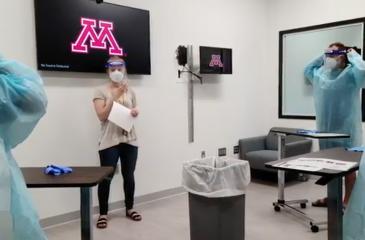Prior to COVID-19, the most life-changing event I remember is September 11, 2001. Looking back over the past 19 years, it is interesting to realize all the things we take for granted today that we had no idea would become part of our lives on September 10 of that year. There are so many things we do to stay safe when we travel: take off our shoes, limit our liquids in carry-on luggage, and undergo a thorough security screening from head to toe. How strange these things seemed at first. How quickly we have adapted to them.
The current pandemic is a similar event, one that will change how we do things and that will require us to adapt in many ways.
We saw this in the adaptation of hands-on clinical training to remote learning. Fortunately, the University had a world-leading resource to help make this possible, M Simulation. This team, led by Dr. Lou Clark, managed to move their program online in only four days. This was critical to allowing our learners to remain engaged and move forward in their education. They also shared their experience and tools worldwide, so that many more students would benefit.
In addition to their work transforming the reach of the curriculum, simulation technicians expanded their roles into education. The 11 team members of M Simulation provided PPE training for 1,623 learners in preparation for the return to clinical environments.
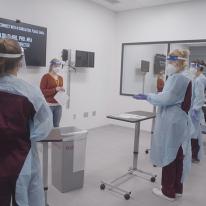
Manifesto for Healthcare Simulation Practice
M Simulation executive director, Dr. Lou Clark, along with 17 simulation leaders from around the U.S. and the world authored the publication, “Manifesto for Healthcare Simulation Practice” calling for safety, collaborative advocacy and ethical leadership in simulation practice and for simulation professionals. Together, they have crafted a manifesto for action, incorporating a more comprehensive understanding of healthcare simulation, beyond tool, technique or experience, to understanding it as a professional practice.
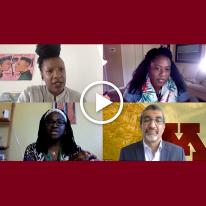
Refusing to ‘Go Back to Normal’: Addressing Structural Racism in Policing, Healthcare, and Other Institutions
The Center for Global Health & Social Responsibility hosted a webinar in June that drew a huge audience and featured engaging discussion among the invited experts, prompting many viewers to submit thoughtful and probing questions. On September 16, UN Special Rapporteur on racism Dr. Tendayi Achiume and Professors Rachel Hardeman (UMN) and Sirry Alang (Lehigh) will return for a second discussion, this time with a focus on identifying a path forward and actionable steps to eliminate racial inequities in health.
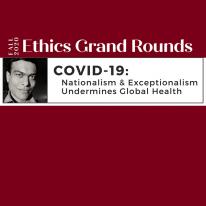
Ethics Grand Rounds: COVID-19: Nationalism & Exceptionalism Undermines Global Health
The Center for Bioethics' Ethics Grand Rounds feature noted local, national, and international bioethics scholars who lecture on a wide variety of ethical issues in health care and the life sciences. On September 18, 2020, they will host “COVID-19: Nationalism & Exceptionalism Undermines Global Health” featuring Jerome Singh, BA, LLB, LLM, MHSc, PhD, a professor of clinical public health, who will discuss global health equity issues connected to COVID-19.This event is created in partnership with the School of Nursing, the School of Public Health, and the Center for Global Health & Social Responsibility. This event is eligible for Interprofessional Education (IPE) credit. | Contact [email protected] with questions.
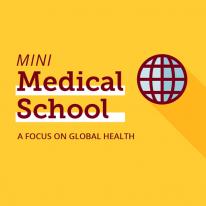
Save the date - Mini Medical School: A Focus on Global Health
The Office of Academic Clinical Affairs and the Center for Global Health and Social Responsibility are excited to announce a virtual Mini Medical School for fall 2020.
Mini Medical School: A Focus on Global Health is designed to broaden understanding of how global health impacts local health. COVID-19 has shown that what happens in one part of the world affects communities everywhere. Session topics will explore global health research and social responsibility. This event is free and open to the public.
Three Online Sessions
Mondays (5:30-7:00 pm CT)
Oct. 5, 12 and 19, 2020
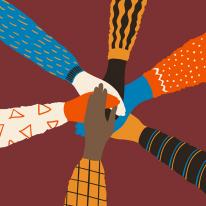
Community Health Collaborative pilot grant
The Community Health Collaborative pilot grant is offered by Clinical and Translational Science Institute's Community Engagement (CEARCH) office, and supports pilot research projects that address community-identified health issues. Past grantees have represented diverse University departments and communities. Applications addressing the following topics are encouraged-- the intersection of COVID-19, structural racism and health disparities; and the intersection of COVID-19 and rural health or aging. Applications are due October 8.
Application details

Call for nominations: Academies for Excellence
Faculty nominations are now being accepted for the Academies for Excellence, which recognize our most distinguished health scientists and educators. Nominations are open to all University of Minnesota faculty.
Deadline for submission is Friday, November 13, 2020 at 4:00 p.m.
If you have any questions or would like more information please contact [email protected].
